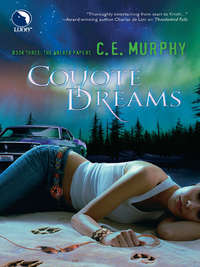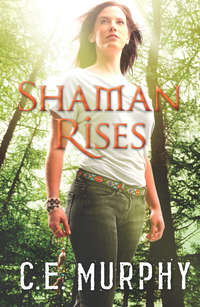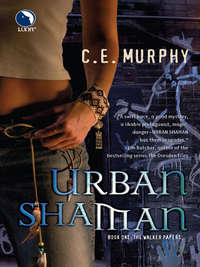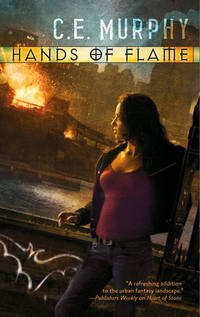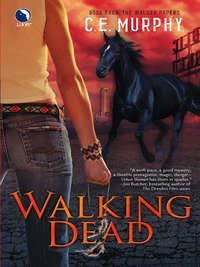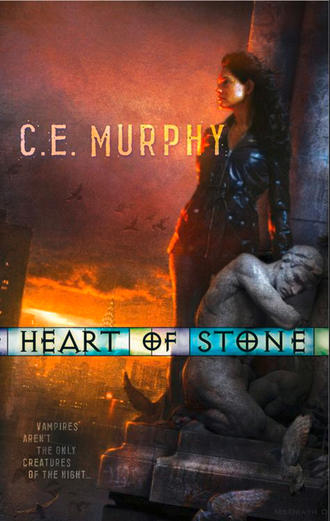
Полная версия
Heart of Stone
“Yeah. My clemency case is about to be decided.” Tony’s eyebrows shot up higher. “The Luka Johnson case?”
“Yeah. I’ve—”
“And there you were claiming just a second ago that you were one of the good guys. The good guys don’t get murderers out of jail, Grit.” He was only half kidding, his smile not reaching his eyes.
Margrit pressed her lips together, giving her head one short shake. “It was self-defense, Tony, and I don’t want to get into it right now. I’ve got to go.”
“All right, fine. Look, Margrit, we never would’ve seen him without your hunch.” Tony squinted against the lights, which hung a few feet below the girders, rendering them effectively invisible. “You did good. Thanks.”
She nodded, stepping around him. “You’re welcome.”
“I think I got something, sir,” McLaughlin called down. The detective tilted his head up, squinting at the lights and McLaughlin’s shadow among them. Margrit took two steps toward the door, then turned back, curiosity impelling her to linger.
“Be careful with it,” Tony called, then lifted his eyebrows at her again. “Thought you had to run.”
“Yeah. Yeah, I just…” Margrit’s calves knotted up and she bounced in anxiety.
“I know. You’ve just got to know.” He gave her a faint, comprehending smile.
“I’m being careful,” McLaughlin said, “but there’s something weird.” He looked down over his shoulder.
“Weird,” Tony echoed. “Is that your clinical diagnosis, Officer?”
“Yes, sir, it is,” he replied without a hint of sarcasm. “I’ll be down in a minute and you can see for yourself.” He grinned then, a note of humor in his voice. “Unless you want to come up here, sir.”
“Watch it, Officer,” Tony said good-naturedly. The man on the ladder laughed. His descent this time was much more cautious, and he spoke as he came down the last few rungs.
“I got an index through ring finger on the left hand and a partial thumb and pinky,” he announced. “And I dusted a partial of his shoes. We’ll let the guys in forensics do their magic.”
“His shoes?” Margrit peered up into the lights, remembering the little girl hanging from the monkey bars, and envisioning herself grasping onto the girders with her arms wrapped around them. “How’d he get his shoes up there?” She glanced at her watch again. She could spare another minute. Two, tops.
“Honestly, it looks like somebody perched up there for a while, ma’am. Like he just dropped down from on top and crouched there. I’m guessing he’s left-handed,” McLaughlin said to Tony. “Judging from the fact that his left hand was his third balance point.” He laid the prints out on the DJ’s table, sweeping a finger over the film-covered dusting paper. “He kept most of his weight on the middle three fingers, only brushed the surface with pinky and thumb. But look at the prints, sir.”
Pulcella leaned over the paper, holding his breath as an unnecessary caution. After several long seconds he straightened up, letting his breath out in an explosion. “He must’ve been wearing gloves.”
“He was not wearing gloves,” Margrit said with absolute certainty. Both cops turned to look at her and color flooded her cheeks. “Well, he wasn’t,” she mumbled. “We were dancing. I had my hands over his. He wasn’t wearing gloves.”
Tony’s expression darkened, one part concern and one part jealousy that not even McLaughlin could miss. He looked from his boss to Margrit, then let out an intended-to-be-nonchalant whistle and deliberately turned back to the prints. Margrit thrust her jaw out and met Tony’s eyes forthrightly. After a few moments he lifted his chin and turned his head away, a gesture of defeat Margrit wouldn’t have expected from him.
“All right,” he grunted. “So tell me how you explain this.” He made a short, sharp movement, indicating the prints. Margrit walked forward warily, not quite trusting the invitation to intrude. Neither cop spoke again, preventing her, and she leaned over the prints.
“He wasn’t wearing gloves,” she repeated, less certainly, nearly a full minute later. Tony stood behind her left shoulder; she twisted her head to look back at him. “I mean, what I don’t know about fingerprints could fill a library, but—” She broke off and frowned down at the prints again. “But I’m sure he wasn’t wearing gloves.”
Ridges and swirls of fine black dust marked the paper. Margrit turned her own hand up, examining her fingerprints closely and comparing them to the prints on the paper. The ridges on her fingertips were much closer together than Alban’s, with nearly twice as many swirls. There was a peculiar consistency to Alban’s, as if tiny streams of water had carved them into oxbows. In the spaces between the ridges, there were porous marks, suggesting pumice. “Acid burns…?” Margrit suggested.
“You’re sure he wasn’t wearing gloves?” Tony growled.
Ir-rah-shun-al pounded out in her temples, better than counting to ten. Margrit inhaled and spoke carefully. “I’m sure he wasn’t when we were dancing. I didn’t look at his hands on the stairs, though.”
“I can’t believe you danced with him.” The detective scowled at her abruptly. “What were you, out of your mind?”
“I didn’t know who he was!” Margrit yelled. McLaughlin took two judicious steps backward and found a mote of dust on his shirt to become concerned with.
“Didn’t you?” Tony demanded. “You’ve been very cozy with this whole investigation since minute one, Grit.”
Margrit’s jaw fell open. “What?”
“You’re the best eyewitness we’ve got, someone who actually spoke with him the night of the murders. He just ‘happens’ to show up at the club you’re at last night? You just ‘happen’ to think he might have been hiding in the rafters? Is this some kind of sick game, Margrit?” Anger and suspicion flooded his voice, as well as jealousy. “It’s not an uncommon pattern for an accomplice to provide just enough information to drag an investigation out. Are you pulling some sort of shit like that, Grit? It’s a federal offense!”
Margrit thinned her lips, deliberately spreading her fingers as if she could release tension through them. When she trusted herself to speak, she said, “I’m well aware of the penalties of interfering in a murder investigation, Anthony. If you intend to arrest me, I invite you to do it now. Otherwise, I suggest you put some more thought behind your spurious claims.”
“Or what,” Tony sneered, “you’ll sue me for libel?”
“It’s slander,” Margrit said through her teeth. “Libel is if it’s in print. If you’ll excuse me, I have somewhere to be.” She turned and stalked toward the door, so tense with anger she could scarcely walk in a straight line.
“Margrit! Margrit!” Tony’s shout followed her down the street.
She ignored him, still walking with great precision, afraid if she began to run she would mow somebody down. The detective caught up to her and grabbed her arm, turning her around. Margrit dropped her gaze to his hand and then lifted it to his eyes.
He let go as if she’d screamed, tucking his hands behind his back, then bringing them forward again to twist together. “I’m sorry. Look, I’m sorry, okay? I don’t have an excuse. I haven’t had enough sleep, but that’s not an excuse, and I’m sorry. I don’t know what got into me.”
“Apparently what got into you was the idea that I’m a coconspirator in a murder case. A suspect, if that word was too big, Detective.” Margrit’s voice found its courtroom tones, polite and mocking to mask outrage.
Tony blanched. “I don’t think you’re a suspect. It’s just—”
“Just a remarkable series of coincidences,” she said with a pointed smile. “I’m so glad you don’t think I’m a suspect, Tony. There’s something we agree on. If you’ll excuse me,” she said again, and turned away.
Tony grabbed her arm once more and spun her around. He lifted both hands to her face and caught her cheeks, bringing his mouth down to hers for a desperate, intense kiss.
For a few seconds Margrit was too stunned to react. His mouth was warm, hands gentle against her face, despite the ardor of the kiss. Someone walking by wolfwhistled with approval.
Margrit shoved Tony away with all her strength, balled up a fist and threw a punch that cracked her knuckles when it hit.
He yowled in pain and surprise, clutching his nose as he staggered back, tears springing to his eyes and spilling down his cheeks. Pure astonishment mingled with hurt in his expression, half-hidden behind his hands.
Margrit shook her fingers, loosening the injured knuckles as she trembled with fury, staring up at him. “This isn’t the movies, Tony,” she spat. “That kind of bullshit doesn’t work in real life.”
Vibrating with angry energy, she turned on her heel and stalked down the street, leaving the detective behind.
A quick shower and change of clothes before a seven-minute subway ride calmed her temper enough that Margrit managed to not stomp as she came back into the office. Her boss met her a few steps inside the door, giving her a brief, approving once-over.
“I didn’t think you were going to make it.” Russell Lomax was thirty years Margrit’s elder and usually dressed in better-quality suits than most public employees could afford. “The governor’s aide just called. They’d like you to meet them at the City Club. You look good, Counselor.”
“Is Luka going to be there?” Margrit glanced at herself—burgundy skirt suit, cream-colored blouse—and scowled at her right hand, where the knuckles were swollen and the skin broken.
“She is. You’ll be meeting her in the back room and you’ll all three go out to talk to the press together.” Russell frowned at her hand. “What happened?”
“Nothing.” Margrit shook her head. “It’s fine. I hope the governor meeting with us is a good sign. He wouldn’t be such a bastard to pull this kind of big stunt for denying the case, would he?” She scowled at her hand again.
“I don’t know. We can hope not,” Russell said with an easy shrug, then lifted his eyebrows at something behind her. “Someone’s lucky day.”
“Luka’s, I hope.” Margrit looked over her shoulder. A delivery boy with a vase full of yellow roses peered at her.
“Margrit Knight? These are for you. Sign here, please.” The boy thrust the vase at her, and Margrit blinked, taking it and fumbling as she tried to comply without dropping it. Russell, looking amused, came to her rescue, scooping up the vase.
“Secret admirer, Margrit?”
“Not that I know about.” She signed and the delivery boy departed as she pushed aside a bundle of baby’s breath to find the card. A quiet laugh, still tinged with anger, escaped as she read it: “I’m a jerk. Forgive me and keep our dinner date? Call me.—Tony”
Margrit curled the card in her fist and shook her head as Russell looked on curiously. “Tony,” she said. “We had a fight.” Her boss’s expression invited further explanation, but she shook her head again. “We’ve got more important things to focus on. Let’s go see how this thing turns out.”
SIX
“IT’LL BE ALL right.” Margrit offered a reassuring smile, squeezing Luka Johnson’s hand and letting calm suffuse her voice. It was an act, a show of composure that hid the fact that her heart was lodged in her throat. Luka’s dark complexion was ashy, her brown eyes flat from worry; she needed Margrit’s confident manner even more than Margrit herself did. There was a discreet police escort outside the room, keeping the bustle of the hall away from the prisoner and her lawyer.
“But what if it ain’t—isn’t?”
Margrit exhaled shakily and lifted a foot to display her shoe. “These are very pointy heels. I’ll step on his toes if it isn’t.” The door whooshed open as she spoke, and Luka’s eyes widened. “He heard that, didn’t he?” Margrit mouthed, before turning to face the governor.
“I heard that, Ms. Knight.” Amusement colored the man’s voice, no concern for the state of his feet evident. He was tall, with features too heavy for handsomeness, but strong enough to give him presence. He offered a hand first to Margrit, then stepped past her to say, “Mrs. Johnson. I apologize. I should have called you both earlier today, but my planned luncheon was canceled and the City Club asked me to step in when their speaker canceled, as well. It’s been a hectic morning.”
“You could say that, sir.” The words came automatically, despite Margrit’s churning stomach and fluttering heart. Law school had taught her to schmooze through stress, if nothing else. “It’s an honor to meet you.”
He grinned down at her. “You, too. You’ve got a hell of an advocate here, Mrs. Johnson.” He turned back to Luka, the grin tempering into a compassionate smile. “I imagine I’ve got you both sick with worry, so let me go ahead and make myself clear before we go in to the lunch.”
Luka’s hand grasped Margrit’s in a white-knuckled grip.
“Even on my worst day, I wouldn’t pull off this kind of spectacle to break a family’s heart, Mrs. Johnson. Clemency is granted,” the governor said. “You’re free to go.”
He stepped forward to help Margrit catch Luka as her legs went out from under her.
The afternoon passed not in a blur, Margrit thought later, but a roar. Anything the governor said as he helped Luka back to her feet was lost in the pounding of blood in Margrit’s ears and the unprofessionally brilliant grin as she pumped his hand in gratitude. Her eyes stung with tears that overflowed without warning, turning into gasping laughs and hiccups of relief and pride and delight. The members of the City Club literally stood and cheered, their applause cutting through the ringing in Margrit’s ears in quick staccato bursts. She stood with her arm around Luka’s waist, the two of them supporting one another, and when the governor beckoned her forward to speak to the club, she tugged Luka with her.
“Today is the hard-won culmination of three years work,” she said into the microphone, to a hundred beaming faces. “Luka and I are both so very pleased and very relieved. So very grateful, Governor, thank you so very much. This is not the first case in which clemency has been granted to a woman acting in self-defense, but it is still a landmark. There are so many small steps we must take in order to assure the safety of everyone in this great city of ours. I hope that someday cases like Luka Johnson’s won’t be necessary anymore, but today’s decision reinforces our determination to take those steps, to continue moving in the right direction. There is so much I could say to all of you—even if I’m preaching to the choir!—but if you’ll excuse us, I think there are a couple of little girls waiting to see their mother.” Arm still wrapped around Luka’s waist, both of them beaming, Margrit withdrew from the luncheon to the sounds of cheers.
Outside the hall was chaos, the press bunched together like a murder of crows. Flash photography blinded them both as microphones were thrust under their noses, and Margrit shouted out the same words she’d spoken in the hall. Hands lifted, she brought the volume of shouts and questions down as they edged forward, nodding encouragement to Luka when she answered a handful of questions herself. It was difficult to pick any one voice out of the din, and Margrit kept losing her determined expression to a grin as she elbowed reporters aside. Russell waited at the bottom of the steps, vehicle idling. Even when the door closed and cut off the reporters’ voices, the pounding of the ocean stayed in Margrit’s ears.
“…which nobody can deny!”
The roar was still with her, this time in her colleagues’ voices as they lifted toasts to her for… Margrit had lost track of the rounds, which probably accounted for some of the roar, she admitted to herself. It wasn’t nearly late enough in the day to be… “Tipsy,” she said out loud, firmly. Russell, on the bar stool beside her, laughed.
“You passed tipsy an hour ago, Margrit. You passed tipsy when you climbed up on the bar to start giving speeches.”
She laughed with him. “At least I’m not standing on it anymore!”
“Just sitting,” Russell agreed with a nod. “You’re tanked.”
“I am not.” Margrit allowed herself a tiny grin and a shrug. “Okay, maybe a little.”
“Although I wouldn’t normally encourage someone to get drunk in front of her boss, I think this time you’ve earned it. Congratulations, Margrit.” Russell shook her hand for the third time, making her grin yet again.
“Thank you, sir. You should’ve seen the kids,” she added to anybody who would listen. “When Luka came in with me the older girl got so excited she burst into tears, so the little girl did, and then we all did.” Luka had embraced the girls’ foster mother fiercely, promising she’d remain a part of their lives. When Margrit had finally excused herself, the four of them, women and girls alike, had been sitting together in a tight bundle, catching up and holding on. Margrit left feeling as if she was walking on clouds.
“So you decided on no dinner date?” Russell asked.
Margrit squinted at him, eyebrows drawn down in furrows before they suddenly shot up. “Oh, shit. No! Crap!” She slid off the counter to the bar stool, then to the floor, dismayed at how it wobbled.
Russell laughed. “You okay? You’ve had a lot to drink.”
“We all have,” Margrit said with a quick grin. “But I haven’t drunk enough to drown my career in alcohol, sir. I’m all right. I’ll be back in a bit.”
The silence outside the bar was deafening. Margrit leaned against the building, still smiling broadly as she auto-dialed Tony. There was no answer, but voice mail picked up and she said, “I won my case. You’re forgiven. Sorry I didn’t get back to you earlier. Um, dinner tomorrow night, maybe? If we can both make it, anyway. Call me back, Tony. I miss you.”
Margrit heard the note of wryness in her own voice as she ended the call. She missed him when times were good more than when they were bad. Another reason, probably, that they rarely stayed together more than a few months before taking a break. It’d been going on for years now, with too much time invested to walk away, yet too many down moments to consider it a successful relationship.
Alban Korund’s pale gaze, colorless in the strange club lighting, flashed in her memory, a startling counterpart to thoughts of Tony Pulcella and his warm Italian coloring. Margrit shook the image off, muttering “Bah” under her breath as she pushed away from the building wall. Men wanted for murder had no business lingering in her imagination, even when the erratic bond with Tony seemed to be a little more strained than usual.
“Miss Knight?” A woman—a girl, really—appeared out of nowhere, as suddenly as Alban departed. Margrit straightened her shoulders, irritated at the stubborn focus of her thoughts.
“I’m sorry,” she said brusquely. “I don’t have any spare change.” She turned her back, reaching for the bar door.
The girl blurted, “No!” and caught her elbow. Margrit jerked away, turning back in outraged astonishment that made the stranger cringe, though it didn’t stop her tongue.
“I need your help, please. Please, I saw you on the news and I don’t know where else to go.” She shifted a bundle under a gray blanket wrapped around her thin shoulders, the whole motion as smooth and choreographed as a dance, then looked up pleadingly. “They’re going to tear our building down and we don’t have anywhere else to go. Please, Ms. Knight.”
“We?” Margrit asked warily. The girl nodded and slipped the blanket away to show Margrit a contented, tiny baby who blinked sleepily and waved a little fist at her.
“My daughter and I. Please. Can you help us?”
Margrit groaned and let the bar door swing shut again.
Alban stepped back, letting the shadows of an alley swallow him. His hair was too bright, too noticeable, to risk moving farther into the light. The police might see him, but more to the point, the girl might see him. What was she doing there? What were they doing here?
A human couldn’t recognize the slightly too fluid movements. Humans saw inexpressible grace if they noticed anything at all. It took another of the Old Races to see one of their own. The girl moved as if she’d been born to live in water, as if the natural substance around her supported her weight, and gravity had no effect. He’d thought there were none of her people left, the selkies whose attempt at saving themselves had driven them out of the sight and minds of the other remaining Old Races.
Alban folded his arms over his chest, watching the girl, watching Margrit. She’d missed her evening run, but others had been out, stretching their legs and jogging, talking about the day’s news. Talking about Margrit—his Margrit, the lawyer for Legal Aid. He’d leaped from one tree to another, following the conversation. Margrit Knight. She was as he’d imagined a lawyer should be: a warrior, fighting the good fight.
He came downtown over the rooftops, finding her offices on Water Street. Early nights were in his favor for once, allowing him to watch from above as a herd of proud, laughing lawyers swept Margrit out of the building as evening fell. It was the second time he’d seen her in something other than running outfits, and as much poise and taste were reflected in her professional clothes as the soft camisole and skirt he’d touched the night before. He curled his hand, feeling none of that delicacy in his own form.
One of a dozen reasons he ought never to have spoken to her at all. Ironically, it was the same reason that made him want to clear his name with her, though he could hardly imagine explaining that reason to her.
What, then, he wondered, did he intend to do? Without explanations, there could be nothing between them, not even the trust needed for a lawyer to fight for her client. With explanations—
With explanations there could be nothing at all. It was the reality of her people and his. Alban lowered his head, folding his fingers into a loose fist. He’d listened to voices below calling congratulations, until the air around him rang with them. Good-natured arguments over who had the honor of buying the first drink lingered even after Margrit and her compatriots entered the upscale pub they’d chosen.
Half a dozen times he’d thought of following them in, wisdom overcoming the impulse every time. He was wanted for questioning about a murder. Walking into a room filled with lawyers would hardly keep him out of the public eye, and he didn’t dare be detained past sunrise. And now too many years of deliberately staying apart had cost him. Margrit had been alone for a few moments, leaning against the building as she spoke into her phone. There had been time to approach. Two centuries of caution made him too slow, and now the girl had joined her.
The girl. Legend had it that the selkie race had tried to save itself by breeding with humans. The other Old Races abhorred the tactic, and no one had wept when the selkies had faded away, drowned in the cold seas they’d come from. A few, it seemed, survived. Alban shook his head and hunched his shoulders as he stood in the shadows. For all their attempts to preserve themselves, it appeared the selkies were left hiding in the darkness with the rest of the Old Races.
Alban strained to hear the conversation, but the wind carried their words the wrong direction, his sensitive hearing unable to compensate. Moving closer was out of the question, the chances of revealing himself too high.
He missed the weight of wings as he shifted his shoulders, the motion too slight without them. Ironic, to counsel himself to patience now, when it was that forbearance that had lost him the chance to speak with Margrit. He sighed and settled deeper into the shadows, watching the two women. He would take the next chance. He had to.
It would explain everything, Margrit thought, if this girl had been following her since yesterday, working up her nerve to come forward. It would explain her own vague uneasiness and sense of being followed. But she’d said she’d heard Margrit’s name only that evening, and Alban had been at the Blue Room the night before. The idea crystallized briefly before fading away again: he’d found her at the club, too unlikely to be coincidence. There had been something to her paranoia.


